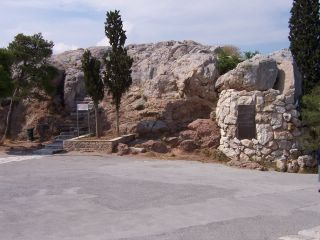|
Areopagus

The Areopagus (literally, Mars-Hill) had
served as the tribunal location in Athens for a millenia by the
time of Paul. Today the high court of Greece is still called the
Areopagus. At the time of Paul, it had ceased to have the same
jurisdictional power it had in classical Greece (5-4th century),
however, its status as a place of trial is without question.
How is the Areopagus significant
for
understanding the world of Paul?
At the Areopagus, Paul is invited to explain his Christian
teachings to the Athenians. As Acts records.
So they took him and brought him to the Areopagus and asked
him, “May we know what this new teaching is that you are
presenting? It sounds rather strange to us, so we would like to
know what it means.” Now all the Athenians and the foreigners
living there would spend their time in nothing but telling or
hearing something new. (Chapter 17, 19-21)
In his speech, Paul will attack various facets of the religious
beliefs of his day. Paul begins his speech by making
reference to an altar to an unknown God:
"You Athenians, I see that in every respect you are very
religious. For as I walked around looking carefully at your
shrines, I even discovered an altar inscribed, 'To an
Unknown God.' What therefore you unknowingly worship, I
proclaim to you." (Acts, chapter 17, verses
22-23)
To continue with Paul, move ahead to the
Acropolis; to learn more about the
altar to an unknown God and how Paul remixes his culture, read
on.
What was this altar?
Although no remnant of this specific altar exists, "ancient
authors such as Pausanias, Philostratus, and Tertullian
speak of Athenian altars with no specific dedication as
altars of 'unknown gods' or 'nameless altars.'"
Scholars posit many possible reasons why such altars
existed. Click here for a website (a detailed commentary on
Acts 17) which describes a few.
http://www.biblegateway.com/resources/commentaries/ ?action=getCommentaryText&cid=5&source=1&seq=i.51.17.3
 How is Paul
remixing the culture of his day?
How is Paul
remixing the culture of his day?
Traditional religious practices in
ancient Greece were polytheistic, in that people worshipped many
gods. For instance, Apollo is the god of the sun; Hades the god
of the underworld. Greek "mythology" records the tales of the
gods and there interaction with humans. Indeed, the Acropolis in
Athens not only boasts the enormous temple to Athena (the patron
god of Athens and of wisdom and war) but also temples to various
gods. People would often make sacrifices to various gods hoping
to receive some sort of divine favor or propitiate that God's
wrath.
By pointing to an altar of an unknown
God, Paul uses a display of excessive religiosity to show the
very bankruptcy of ancient Greek religion. The very mythology
designed to help people understand how the gods were involved in
human affairs eventually failed to offer people a real
connection with divinity. God had been replaced by stories and
superstition, culminating with altars dedicated to unknown Gods.
Ancient Greek religion asked people to accept that their lives
were influenced by very human gods, ultimately controlled by
fate, with whom they did not interact.
Paul uses this as a launching pad for proclamation, to tell
people that the God behind the scenes is no longer hidden, but
is revealed, namely, in Jesus Christ.
source:
info about "unknown god" findings: http://www.usccb.org/nab/bible/acts/acts17.htm |



